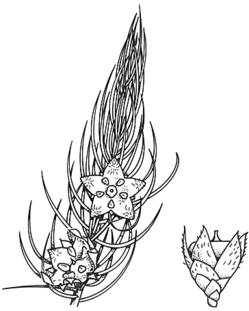Common name: Jam Tarts
Melichrus procumbens (Cav.) Druce APNI* 
Description: Procumbent shrub, forming mats or ascending to 20 cm high.
Leaves upwardly appressed near end of branches, horizontal to reflexed on lower surface, 11–28 mm long, 1.2–4 mm wide, scabrous and with scattered longer hairs and deeply 10–14 ribbed on lower surface, margins often narrow-hyaline, with scattered short to long hairs; petiole to c. 0.5 mm.
Flowers on underside of branches, cream or pale green with pink-tinged lobes; bracteoles 3–5.5 mm long. Sepals 5–7.5 mm long, silky, greenish. Corolla tube saucer-shaped, 2–2.5 mm long; lobes 3–3.5 mm long, spreading, glabrous or with a few hairs inside.
Fruit depressed-globose, 2–4 mm long, green to red, smooth, glabrous.
Flowering: July–September
Distribution and occurrence: Grows in heath and dry sclerophyll forest on sandstone or granite; north from Kogarah, Sydney area.
NSW subdivisions: NC, CC, NT, CT
Other Australian states: Qld
Text by J. M. Powell, except for groups with contributors listed
Taxon concept: Flora of NSW 3 (1992)
ECOLOGY
Life History
Flowers Cream or pale green with pink-tinged lobes, May--October, peak September.
Fruit/seed Succulent fruit (drupe), mature August--November.
Fire response Resprouts from ground level or below (Fox 1988).
Habitat
Habitat Plateaus.
Altitude 0--700 m
Annual rainfall 900--1400 mm
Typical local abundance Rare--frequent.
Vegetation Eucalypt forest e.g. with Eucalyptus gummifera, E. punctata, Angophora bakeri, heath e.g. with Angophora hispida, Banksia ericifolia.
Substrate Low-nutrient sandstone soils, deep sandy loam, well-drained.
APNI* Provides a link to the Australian Plant Name Index (hosted by the Australian National Botanic Gardens) for comprehensive bibliographic data
***The AVH map option provides a detailed interactive Australia wide distribution map drawn from collections held by all major Australian herbaria participating in the Australian Virtual Herbarium project.
|


